Another “Eastern Eye” Article
[The Bible is an “Eastern” book. It was written many years ago in the “East” which today we refer to as “The Middle East.” As such, there are many customs and idioms that are not familiar to the “Western” mind.]
Jesus Christ asked a very pointed question to those who had gone out into the wilderness to hear John the Baptist teach. He asked them what they went out to see, a “reed shaken in the wind?”
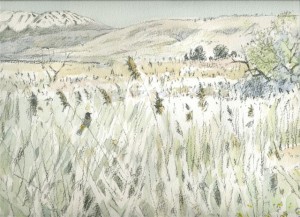 Our western minds really have no idea what Jesus was talking about. But once again, understanding the time and culture of the Bible sheds light on many verses.
Our western minds really have no idea what Jesus was talking about. But once again, understanding the time and culture of the Bible sheds light on many verses.
The reeds Jesus spoke of were in the sugar cane family and grew wild. They were used often to make flutes. They would generally grow 4 to 5 feet tall. During the heat of the day, they would droop, with the tops falling all the way to the ground.
When the cool evening winds came, they would all rise back up again, straight and tall. The people thought this was a beautiful sight to see, and would often go out to watch them all rise again.
It Was A Straightforward Question
Jesus asked those who had gone out to see John the Baptist, “What did you go out to see? A reed shaken in the wind?” In other words, he was asking if they were paying attention to what John was saying, or were they distracted by the reeds?
Of course there was nothing wrong with watching the reeds. It was a beautiful sight to see. But for those who went out specifically to see John, Jesus wanted to know what they were focused on. Were they listening to what John had to say, or were they distracted?

Santa Maria de Maggiore - Rome
There are many old churches around the world that are very beautiful. I’ve personally visited some of the most famous ones in Spain, Italy and Greece. There is much in those churches that could distract someone.
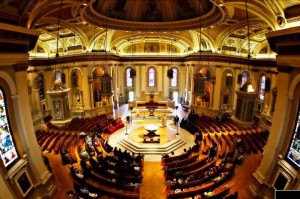
St. Joseph Cathedral Basilica in San Jose, CA
There are many modern churches that are beautiful too, with an abundance of stained glass, gorgeous woodwork, decorations, am impressive choir, and the list goes on and on. Again, there is plenty to distract.
What Is Most Important?
Wherever one goes to hear God’s Word, the beautiful decorations are not what’s most important. It is not how big the choir is. It is not even how many people attend. If God’s Word is being taught, then that is what is most important.
It is the message that we should be going to hear. Yes decoration and embellishments may be nice, but the Word of God can be taught without any of those things. You may remember that Jesus taught God’s Word to two men as they walked on the road to Emmaus.
The Bible doesn’t say, but maybe Jesus heard people who went to see John talking about how great the reeds were. I’ve heard many people over the years talk about how great the choir was in the church that they attended. I’ve heard others talk about how big and beautiful their church is, and how many people attend. It would seem that they ought to be talking about how great the message was, don’t you think?
Where do you go to hear the Word of God? If the Word of God  is being taught, then focus on the message. The trappings may be nice, but it’s the good news of the Gospel of Jesus Christ that is most important.
is being taught, then focus on the message. The trappings may be nice, but it’s the good news of the Gospel of Jesus Christ that is most important.
Matthew 11:7
As they departed, Jesus began to say to the multitudes concerning John: “What did you go out into the wilderness to see? A reed shaken by the wind?Luke 7:24
When the messengers of John had departed, He began to speak to the multitudes concerning John: “What did you go out into the wilderness to see? A reed shaken by the wind?
Mike Verdicchio
Leave A Comment!
Do you have some thoughts about this? We’d love to hear what you think. To leave a comment if you are receiving this post via email or RSS, just click the title above and scroll to the bottom of the post and type in your comment. If not, just scroll to the bottom of this post and type in your comment.
Share This Article!
To share this article on social media, like Facebook, or, Twitter, there are buttons below. Or, if you are a subscriber receiving these posts by email, feel free to forward them to others.
Resources
There are a number of books that you can read to get insight on customs, manners, idioms and meanings from the Eastern culture in which the Bible was written. The best I know of were written by Bishop K. C. Pillai I have had the pleasure of listening to many recorded teaching by him.
He wrote three books, and they are hard to find, and are usually over priced. But, if you want to you can check this link to see what Amazon has to offer. Light Through an Eastern Window
Another great resource that I have used for years is a book called, “Manners and Customs of the Bible,” by James Freeman. Mine was printed in 1972 and I know they have newer additions. For the newest edition, just click the link and it will take you to Amazon. The New Manners and Customs of the Bible (Pure Gold Classics)

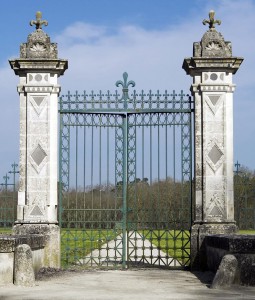 The expression, “gates of hell” occurs only once in the Scriptures. The context in which Jesus uses that expression is very interesting. He had asked his disciples who people were saying that he was. Finally, he asked them, “But who do you say that I am?”
The expression, “gates of hell” occurs only once in the Scriptures. The context in which Jesus uses that expression is very interesting. He had asked his disciples who people were saying that he was. Finally, he asked them, “But who do you say that I am?” building nor a denomination. His church is comprised of those who believe in Christ, and Ephesians states that Christ is the head of the church.
building nor a denomination. His church is comprised of those who believe in Christ, and Ephesians states that Christ is the head of the church.

 is that? The privileges and abilities we have received by believing in Christ are not automatic in our lives.
is that? The privileges and abilities we have received by believing in Christ are not automatic in our lives. Jesus Christ is the master, and the Bible tells us that it is Christ in us. Therefore when it comes to fears, worries, and anxiety, we don’t allow those to dominate us. But instead, we are masters over our lives by the strength of the Christ in us.
Jesus Christ is the master, and the Bible tells us that it is Christ in us. Therefore when it comes to fears, worries, and anxiety, we don’t allow those to dominate us. But instead, we are masters over our lives by the strength of the Christ in us. lot of pages missing from their Bibles! Yes, we have indeed been given eternal life, but what about this life we live now? The Bible declares that it is Christ in us, the hope of glory, that we are more than conquerors, that we can do all things through Christ who strengthens us and, that greater is he that is in us than he that is in the world.
lot of pages missing from their Bibles! Yes, we have indeed been given eternal life, but what about this life we live now? The Bible declares that it is Christ in us, the hope of glory, that we are more than conquerors, that we can do all things through Christ who strengthens us and, that greater is he that is in us than he that is in the world. Fears, worries and anxiety may certainly confront us, but it is up to us to determine that we will believe who the Bible says that we are, and choose to accept that we can do what the Bible says that we can do. As a born again one, we are part of Christ’s church, and he declared that the gates of hell shall not prevail against it.
Fears, worries and anxiety may certainly confront us, but it is up to us to determine that we will believe who the Bible says that we are, and choose to accept that we can do what the Bible says that we can do. As a born again one, we are part of Christ’s church, and he declared that the gates of hell shall not prevail against it. For example, the Scriptures say that there was a famine in Samaria that was so bad that people were selling “ass’s heads” and “dove’s dung for food.” Without understanding the eastern culture, to us that sounds ridiculous. But it sounds no more ridiculous than it would to someone not familiar with our culture who hears that people in the United States eat “buffalo wings.”
For example, the Scriptures say that there was a famine in Samaria that was so bad that people were selling “ass’s heads” and “dove’s dung for food.” Without understanding the eastern culture, to us that sounds ridiculous. But it sounds no more ridiculous than it would to someone not familiar with our culture who hears that people in the United States eat “buffalo wings.” was what they called a root which grew in the hedges. It was not very tasty to say the least. In fact, only cows or donkeys would eat it.
was what they called a root which grew in the hedges. It was not very tasty to say the least. In fact, only cows or donkeys would eat it.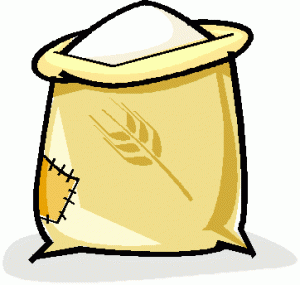 If you take a little time to read the whole record in the book of II Kings, Chapter 6 and 7, you will discover something absolutely remarkable. Within a 24 hour period, the entire economy was completely turned around. In 24 hours, two measures of barley sold for a single shekel, and a measure of fine flour, also for one single shekel.
If you take a little time to read the whole record in the book of II Kings, Chapter 6 and 7, you will discover something absolutely remarkable. Within a 24 hour period, the entire economy was completely turned around. In 24 hours, two measures of barley sold for a single shekel, and a measure of fine flour, also for one single shekel. This is true in any culture. Suppose someone was completely unfamiliar with the culture here in the United States and they heard expressions like, “I sat down in the recliner for awhile because my dogs were really barking,” or, “For supper I had a hot dog,” or, “It was hard to sleep because it was raining cats and dogs.”
This is true in any culture. Suppose someone was completely unfamiliar with the culture here in the United States and they heard expressions like, “I sat down in the recliner for awhile because my dogs were really barking,” or, “For supper I had a hot dog,” or, “It was hard to sleep because it was raining cats and dogs.” would soak into the stones and over a period of time, at a glance, the stones might even look like the bread. But no father would ever be that stupid to mistake a stone for bread and give it to his son who asked him for bread.
would soak into the stones and over a period of time, at a glance, the stones might even look like the bread. But no father would ever be that stupid to mistake a stone for bread and give it to his son who asked him for bread. In the eastern lands there are some water serpents that look similar to fish. A person who was unfamiliar with both fish and water serpents could easily mistake one for the other. But a father who would be concerned about his family would certainly make sure that there was no mistake. If his son asked for a fish, then that is what a good father would give him.
In the eastern lands there are some water serpents that look similar to fish. A person who was unfamiliar with both fish and water serpents could easily mistake one for the other. But a father who would be concerned about his family would certainly make sure that there was no mistake. If his son asked for a fish, then that is what a good father would give him.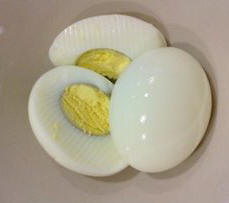 Perhaps a young child might not recognize the difference between the body of a scorpion and an egg. But what father would not know? What father, whose son asked for an egg, would ever mistakenly or even intentionally give his son a scorpion instead?
Perhaps a young child might not recognize the difference between the body of a scorpion and an egg. But what father would not know? What father, whose son asked for an egg, would ever mistakenly or even intentionally give his son a scorpion instead? In our culture perhaps we could understand this if the
In our culture perhaps we could understand this if the  question would have been about candy. If our child asked us for some candy, would we give them marbles instead? If they asked for some marshmallows, would we give them a cotton ball instead? Would we? Well of course not!
question would have been about candy. If our child asked us for some candy, would we give them marbles instead? If they asked for some marshmallows, would we give them a cotton ball instead? Would we? Well of course not!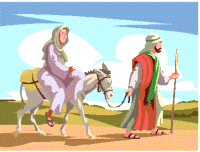
 instead of a big fancy hotel fit for a king, that the swaddling clothes must have been some type of rags, or at best, some cheap clothes to keep him warm. Once again, an understanding of the customs of the East brings great insight to this great event.
instead of a big fancy hotel fit for a king, that the swaddling clothes must have been some type of rags, or at best, some cheap clothes to keep him warm. Once again, an understanding of the customs of the East brings great insight to this great event. would be anywhere from fifteen minutes to two hours. During that time, the parents would pray and offer their vows to God concerning the child that God had blessed them with. At the end of that time, the swaddling clothes were removed and the normal baby attire would be put on the child.
would be anywhere from fifteen minutes to two hours. During that time, the parents would pray and offer their vows to God concerning the child that God had blessed them with. At the end of that time, the swaddling clothes were removed and the normal baby attire would be put on the child.



 people to enter into agreements by signing what we refer to as a contract.
people to enter into agreements by signing what we refer to as a contract.  Not so long ago, they did it with a simple hand shake. One of the oldest known covenants in the world is the covenant of salt.
Not so long ago, they did it with a simple hand shake. One of the oldest known covenants in the world is the covenant of salt.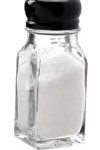
 Sadat of Egypt, Begin was greeted as he set foot on Egyptian soil. It was reported that the two men stopped to take bread and salt together.
Sadat of Egypt, Begin was greeted as he set foot on Egyptian soil. It was reported that the two men stopped to take bread and salt together. Perhaps you have attended weddings where salt was involved in the service. In many of the weddings I have officiated, the couple, understanding the significance of the salt covenant, requested to partake in a salt covenant on their special day.
Perhaps you have attended weddings where salt was involved in the service. In many of the weddings I have officiated, the couple, understanding the significance of the salt covenant, requested to partake in a salt covenant on their special day.
 But there were occasions in the Bible times when the merchant would cry out, “Come and buy without money and without price.” When people heard a merchant crying out, “Come and buy without money and without price,” they knew it meant someone was grateful to God for reaching a milestone in their life.
But there were occasions in the Bible times when the merchant would cry out, “Come and buy without money and without price.” When people heard a merchant crying out, “Come and buy without money and without price,” they knew it meant someone was grateful to God for reaching a milestone in their life.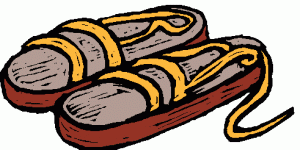 an Eastern idiom. It has to do with what you walk away with in your mind, what you carry in your mind.
an Eastern idiom. It has to do with what you walk away with in your mind, what you carry in your mind.